Awesome
Nation- (and City-) Specific Victory City Markers
-
-
Ossel, will these pieces be different colors or just gray?
Thanks,
John
-
Ossel, will these pieces be different colors or just gray?
Thanks,
John
Shapeways offers many different options (with different prices as well). Right now it looks like the (plastic) options are:
White
Black
Grey (“Alumide”, so metallic grey)
Blue
Purple
Red
PinkSo, if you’re looking for faction-specific colors, the answer to your question is, no, the options are a bit more limited.
Metals are also an option (at a much higher price) as someone mentioned before.
-
Ossel, will these pieces be different colors or just gray?
Thanks,
John
Shapeways offers many different options (with different prices as well). Right now it looks like the (plastic) options are:
White
Black
Grey (“Alumide”, so metallic grey)
Blue
Purple
Red
PinkSo, if you’re looking for faction-specific colors, the answer to your question is, no, the options are a bit more limited.
Metals are also an option (at a much higher price) as someone mentioned before.
Ok, appreciate that. I didn’t know if they would be sold on HBG’s site as well or not.
John
-
I offered, but didn’t get any feedback. It might be an option in the future, but for now I’m going to sell them on my own.
-
ROME!
Magnifico!
Regarding the idea of metals, I briefly considered that brass might be a nice option…but then I remembered that brass needs to be polished periodically or else it tarnishes.
Colour-wise, I think grey plastic would be a good choice. It’s neutral compared to the national sculpt colours, so it would fit everybody, and it would also parallel the grey generic IC pieces from the early games.
-
Here’s a fun idea. If the markers could be produced in translucent white plastic, you could run off a set for jluna1273 whose custom Global 1940 table…
http://www.axisandallies.org/forums/index.php?topic=29890.45
…has its victory cities wired with lights that glow red or green depending on who controls them. If he placed the translucent white markers over the lights, the markers themselves would light up to show who holds each city, which would be very cool.
-
NICE. Yeah, there is definitely a translucent option! :-D
-
@CWO:
Here’s a fun idea. If the markers could be produced in translucent white plastic, you could run off a set for jluna1273 whose custom Global 1940 table…
http://www.axisandallies.org/forums/index.php?topic=29890.45
…has its victory cities wired with lights that glow red or green depending on who controls them. If he placed the translucent white markers over the lights, the markers themselves would light up to show who holds each city, which would be very cool.
Now that, would be cool! :-D
-
The wattage of the VC bulbs (he used LEDs, I think) is no doubt very small, but the illuminated markers could probably be photographed in a dramatic way with a camera that has manual exposure control: wait for night-time, light up the markers, turn off all the lights in the room, open the camera shutter, expose the markers for a few seconds to have the glow register nicely, fire off a flash to expose the map board itself, then close the shutter. It might take a few experimental tries to get it right, but the result would be impressive!
-
Ossel’s markers are shaping up so spectacularly that I’m thinking it would be a shame for some of the victory cities to end up with markers which are simply molded versions of the A&A roundels (as he mentioned might be the case). I’ve therefore expanded and refined the suggestions which have already been made, and I’ve found some pictures to illustrate these different concepts. In some cases I have definite favourites, but in others I couldn’t make up my mind which options I preferred. Here are the results of my analysis. Because of the two-pictures-per-post limit, I’ll broken the information into several pieces. Comments are welcome, and of course Ossel – since this is his project – will ultimately get to decide what options he’ll use for each VC.
The cities which have been completed and posted by Ossel so far are:
Berlin (Brandenburg Gate)
London (Big Ben + Parliament Buildings)
Paris (Eiffel Tower)
Rome (Colosseum)
Washington (Capitol Building + Washington Monument)
The following cities have not been completed yet, but (like the five previous ones) they have iconic and easy-to-recognize structures associated with them:
Moscow
Marker suggestion: Kremlin and/or St. Basil’s CathedralOttawa
Marker suggestion: Parliament Centre Block + Peace TowerSan Francisco
Marker suggestion: San Francisco Bay + Golden Gate Bridge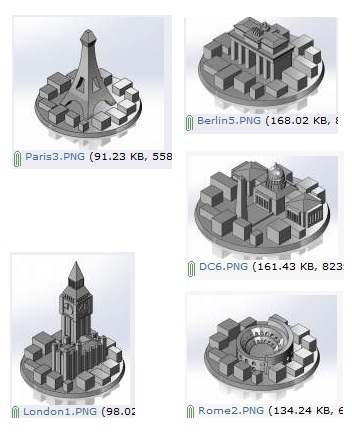
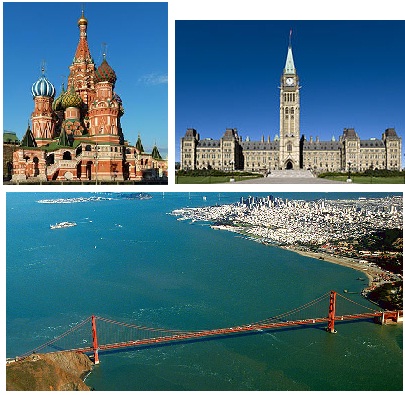
-
Now we get to the cities which are more problematic, starting with Cairo and Honolulu. For Cairo, I think the Giza Necropolis would be the best choice. It’s not located in Cairo itself, but it’s only 25 km away and it’s iconically Egyptian.
For Honolulu, Ossel had originally proposed a little Pearl Harbor and I had later proposed the Aloha Tower. Ossel noted that the Aloha Tower might not be recognizable, which is a good point in view of the small scale of the planned markers. Given the precedent of using San Francisco Bay and the Golden Gate Bridge to represent San Francisco Bay (in other words, a large structure set in a landscape rather than amongst a ring of small buildings), Ossel’s original suggestion would fit nicely along the same lines – so I’d be happy with a marker showing Ford Island, Battleship Row, and some of the surrounding landscape.


-
As far as Russia goes, Moscow has already been handled and Leningrad looks as if it it would be served nicely by the Winter Palace. Stalingrad, however, is a problem. In the 1940s, the city wasn’t known for its outstanding architecture: to the south was the oldest part of town (log huts and wooden buildings), in the centre was the modern city (concrete and steel structures), and to the north were three large factories with nearby housing for the workers. None of those components sounds very exciting to me. Nobel Hobo suggested using the Old Mill, also known as the Grain Elevator which was the site of epic resistance by a small group of Russian soldiers in 1942, so that might be one possibility…but as a building representing a whole city, it might look a little odd compared to the more monumental markers that have already been discussed. The heroic statue “The Motherland Calls” was a suggestion of mine that I still quite like, but I’ve also pointed out that it was a postwar memorial to the Battle of Stalingrad and hence would be anachronistic. One statue that might do the job nicely is the Barmaley Fountain (showing six children dancing in a circle), of which there are 1943-vintage photos and film footage showing it among the devastated buildings of the city. Continuing with the statue idea, another possibility would be “Worker and Kolkhoz Woman”, a classic example of socialist realism. It was created for the 1937 Paris World’s Fair, and it looks very Soviet. Unfortunately, it has the opposite problem of “The Motherland Calls”: right time period but wrong city (it was moved to Moscow after the World’s Fair). On the other hand, it incorporates the hammer and sickle – something which ties in nicely with the USSR game roundel. So this is one of the cities for which I can’t really decide what I’d like best.

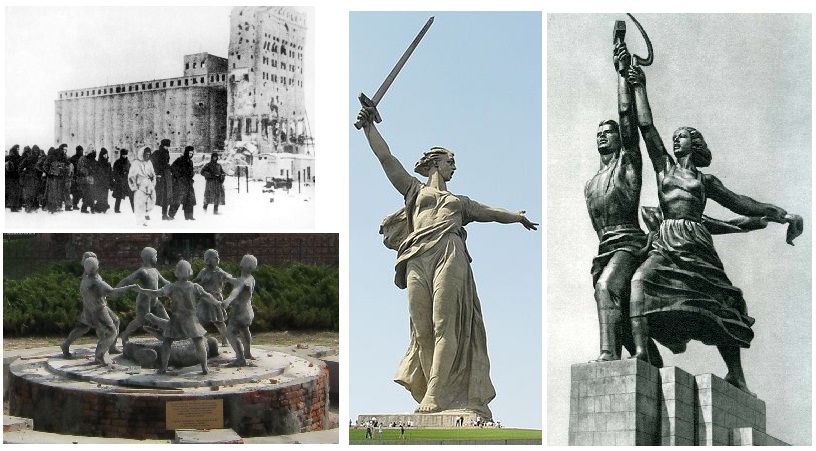
-
For the three VCs located in the Far East (Tokyo, Shanghai and Hong Kong), I looked at the marker suggestions which have been made and I noted that some of them include pagoda-type structures. I checked into the subject a bit, and it seems that pagodas are found in the architecture of many Asian countries (including China and Japan). Experts can probably tell the difference between the various national styles, but I certainly can’t. Since torii gates (the suggestion I’d made for Tokyo) are distinctly Japanese, it seems to me that picking a torii for Japan (which needs only one marker) would enable pagoda-like structures to be used exclusively for China (which needs two markers). So for Tokyo I’d recommend using the Meiji Shrine in Tokyo (dedicated to the Emperor who ended the Tokugawa Shogunate and brought Japan into the modern world), which has a torii gate decorated with the imperial chrysanthemum seal.
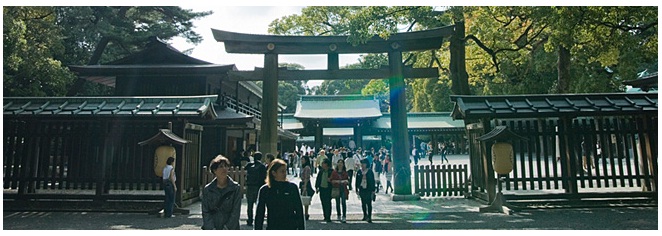
-
As for Shanghai and Hong Kong, Nobel Hobo suggested using the Yu Garden and the Wong Tai Sin Temple respectively. The Main Altar of the Wong Tai Sin Temple would be a good choice, in my opinion, for Hong Kong. I’d then opt for a Yu Garden building that looks distinctively different from the Hong Kong marker – so for Shanghai, I’d pick the Yu Garden’s Dianchun Hall, which is built in a different style from the Main Altar and has a stream and a nice little bridge beside it.
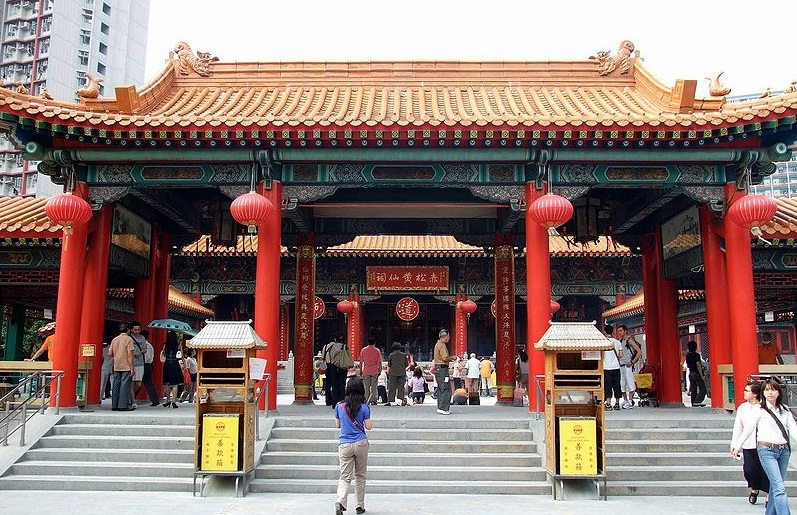
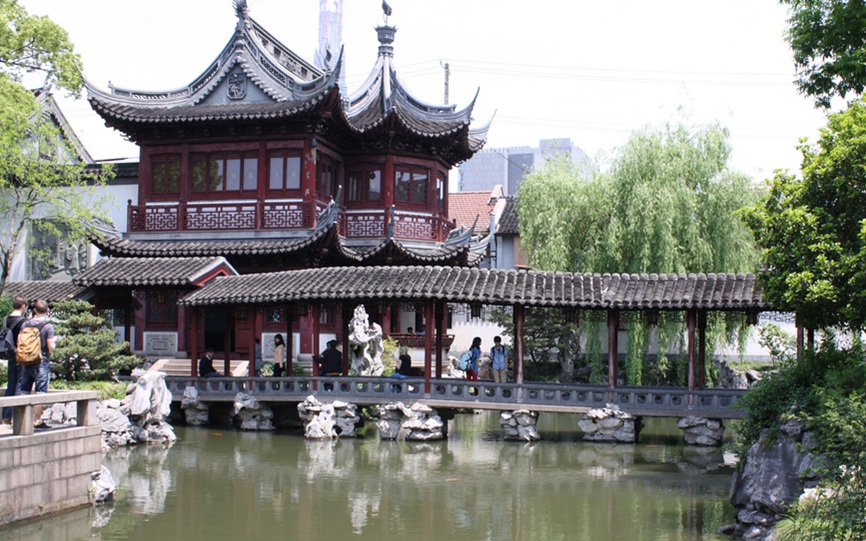
-
For Sydney, Nobel Hobo proposed using the Sydney Harbour Bridge, an idea which would be along the lines of using the Golden Gate Bridge for San Francisco. The two bridges are very different in appearance, which is good, and the Sydney one opened in 1932, so that fits with the required WWII time frame.
For Calcutta, Nobel Hobo proposed using Victoria Memorial Hall. Ossell commented that not a lot of people would recognize it; I concur with this point, and I would add that the building doesn’t look particularly Indian. (It was designed by an Englishman and its style apparently “uses a mixture of British and Mughal elements as well as Venetian, Egyptian, Deccani and Islamic architectural influences”.) I had earlier proposed the Taj Mahal as a possibility, but I had also pointed out that it was in the wrong city. As it turns out, it has the additional problem of being an example of Islamic rather than Indian architecture. So my preference would be for the Dakshineswar Kali Temple, a Hindu temple located near Kolkata. Admittedly it doesn’t score a lot of points on the recognizability scale, but it has the virtue of being built in a traditional style of Bengal architecture.


-
For Manila, Nobel Hobo proposed using the Jose Rizal Monument. That would be one possibility, and so would the Intramuros citadel district of Manila – more specifically, Fort Santiago. Another option might by to use Corregidor Island, which is just 30 or so miles away, has a fairly distinctive saddle shape and is, of course, famous in WWII history.
For Warsaw, Nobel Hobo proposed using the Wilanów Palace, which would be one possibility. Other options would be: 1) the Old Town Market Place with the Warsaw Mermaid statue at its centre; 2) the Warsaw Barbican; or 3) one of Warsaw’s many churches, for example the Carmelite Church, a.k.a. the Church of the Assumption of the Virgin Mary and of St. Joseph, which appears to have a small onion dome that gives it a nice Slavic architectural touch.
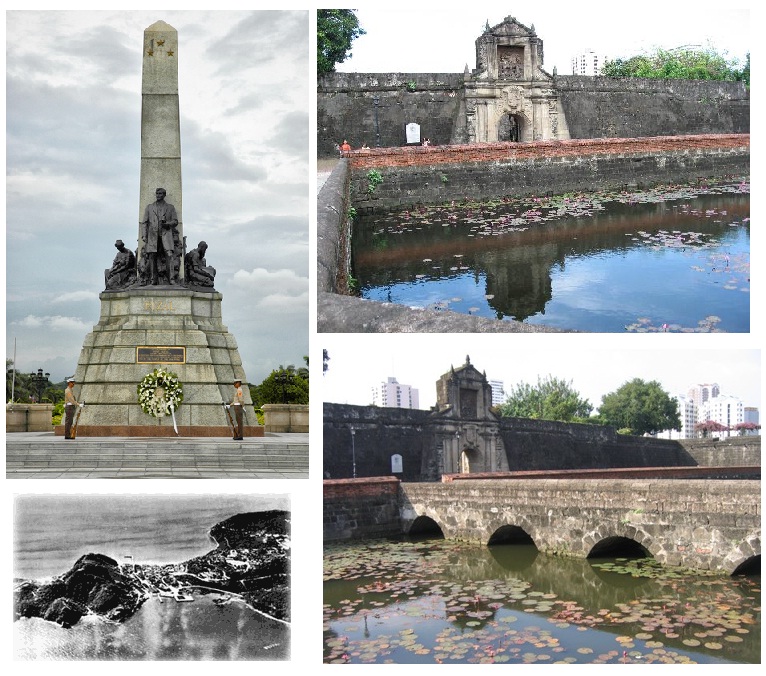
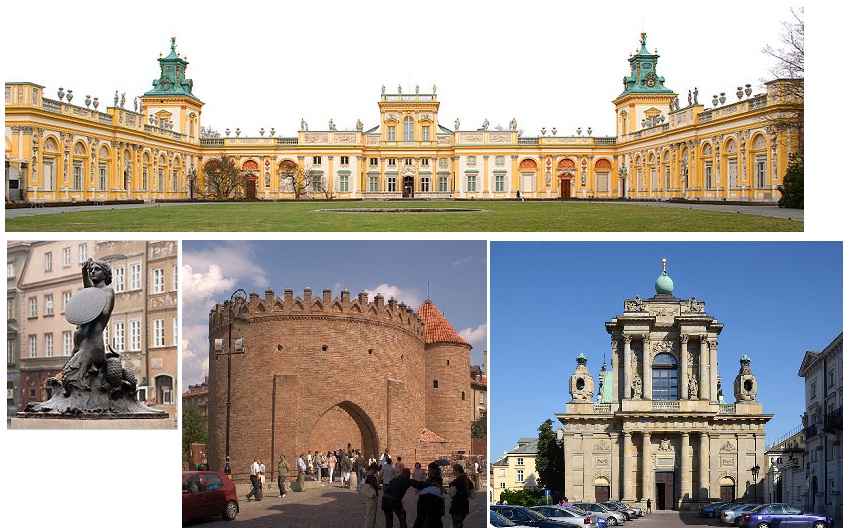
-
@CWO:
Now we get to the cities which are more problematic, starting with Cairo and Honolulu. For Cairo, I think the Giza Necropolis would be the best choice. It’s not located in Cairo itself, but it’s only 25 km away and it’s iconically Egyptian.
For Honolulu, Ossel had originally proposed a little Pearl Harbor and I had later proposed the Aloha Tower. Ossel noted that the Aloha Tower might not be recognizable, which is a good point in view of the small scale of the planned markers. Given the precedent of using San Francisco Bay and the Golden Gate Bridge to represent San Francisco Bay (in other words, a large structure set in a landscape rather than amongst a ring of small buildings), Ossel’s original suggestion would fit nicely along the same lines – so I’d be happy with a marker showing Ford Island, Battleship Row, and some of the surrounding landscape.
I agree with these two as the symbols for Cairo and Honolulu. Everyone recognizes the pyramids and as far as Honolulu, I guess Ford Island would be as good as any. The only other thing I can think of in Hawaii, is the volcanoes, which could be cool.
-
@CWO:
As far as Russia goes, Moscow has already been handled and Leningrad looks as if it it would be served nicely by the Winter Palace. Stalingrad, however, is a problem. In the 1940s, the city wasn’t known for its outstanding architecture: to the south was the oldest part of town (log huts and wooden buildings), in the centre was the modern city (concrete and steel structures), and to the north were three large factories with nearby housing for the workers. None of those components sounds very exciting to me. Nobel Hobo suggested using the Old Mill, also known as the Grain Elevator which was the site of epic resistance by a small group of Russian soldiers in 1942, so that might be one possibility…but as a building representing a whole city, it might look a little odd compared to the more monumental markers that have already been discussed. The heroic statue “The Motherland Calls” was a suggestion of mine that I still quite like, but I’ve also pointed out that it was a postwar memorial to the Battle of Stalingrad and hence would be anachronistic. One statue that might do the job nicely is the Barmaley Fountain (showing six children dancing in a circle), of which there are 1943-vintage photos and film footage showing it among the devastated buildings of the city. Continuing with the statue idea, another possibility would be “Worker and Kolkhoz Woman”, a classic example of socialist realism. It was created for the 1937 Paris World’s Fair, and it looks very Soviet. Unfortunately, it has the opposite problem of “The Motherland Calls”: right time period but wrong city (it was moved to Moscow after the World’s Fair). On the other hand, it incorporates the hammer and sickle – something which ties in nicely with the USSR game roundel. So this is one of the cities for which I can’t really decide what I’d like best.
Either one of the last two statues would be the best bet, I would think.
-
@CWO:
For the three VCs located in the Far East (Tokyo, Shanghai and Hong Kong), I looked at the marker suggestions which have been made and I noted that some of them include pagoda-type structures. I checked into the subject a bit, and it seems that pagodas are found in the architecture of many Asian countries (including China and Japan). Experts can probably tell the difference between the various national styles, but I certainly can’t. Since torii gates (the suggestion I’d made for Tokyo) are distinctly Japanese, it seems to me that picking a torii for Japan (which needs only one marker) would enable pagoda-like structures to be used exclusively for China (which needs two markers). So for Tokyo I’d recommend using the Meiji Shrine in Tokyo (dedicated to the Emperor who ended the Tokugawa Shogunate and brought Japan into the modern world), which has a torii gate decorated with the imperial chrysanthemum seal.Â
This would be good for the time period and for its architecture.






